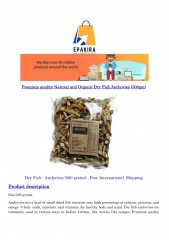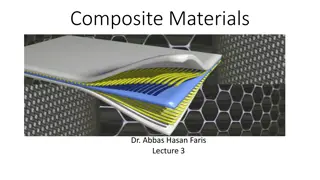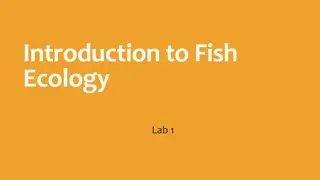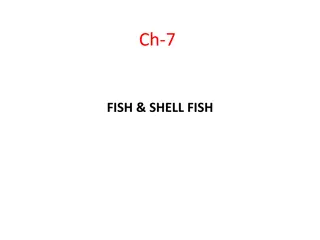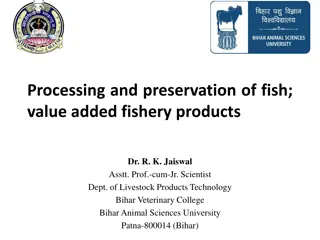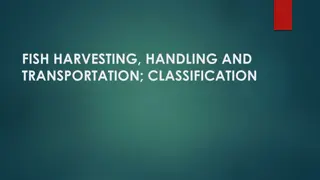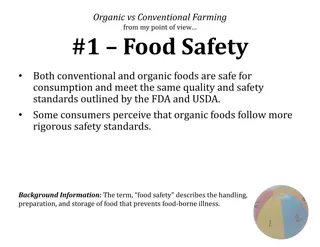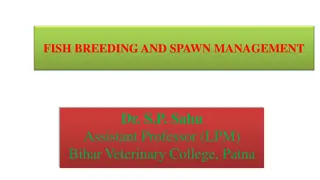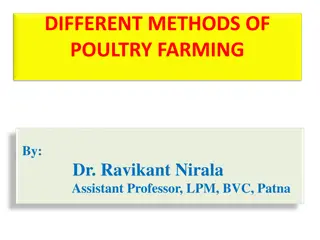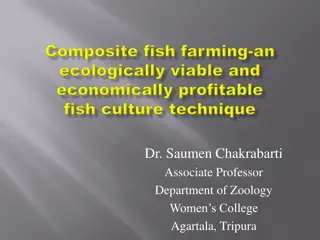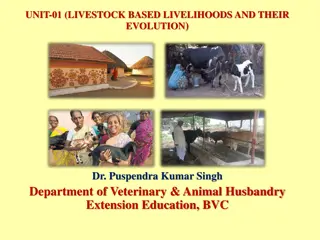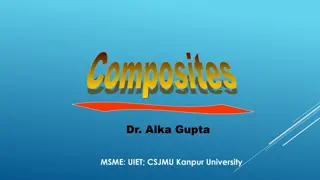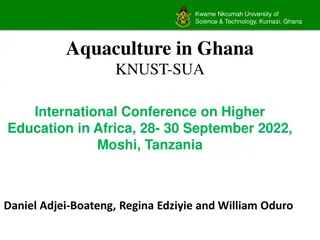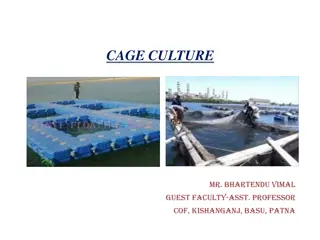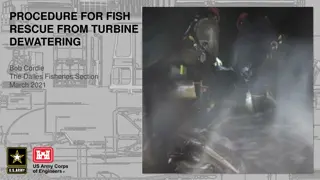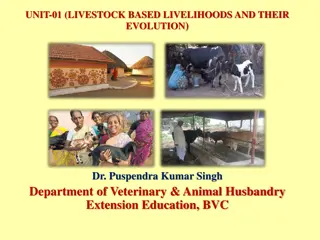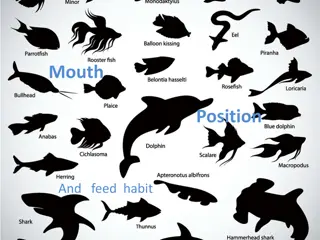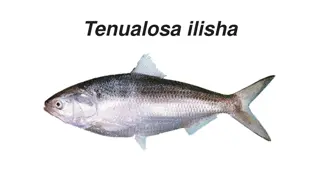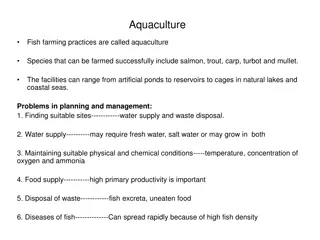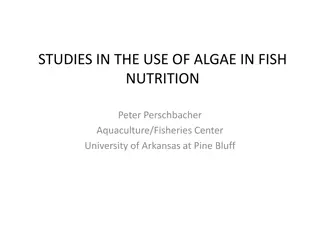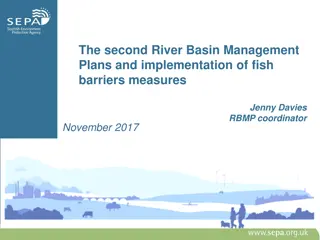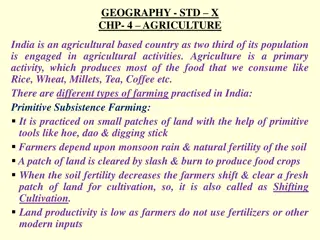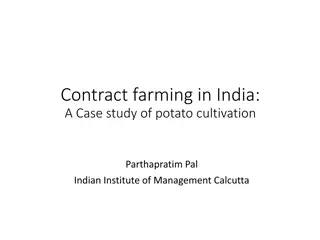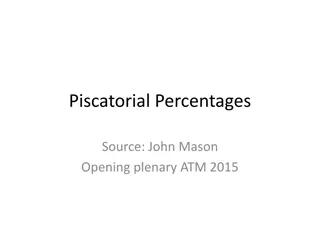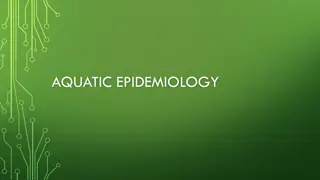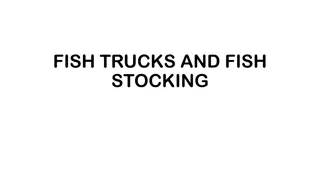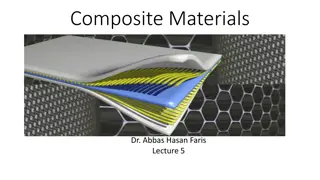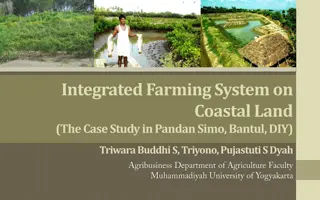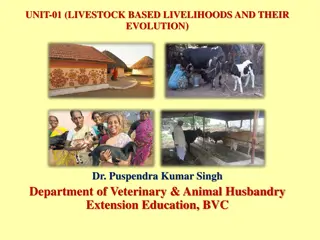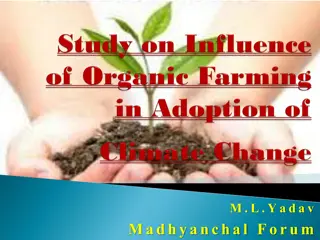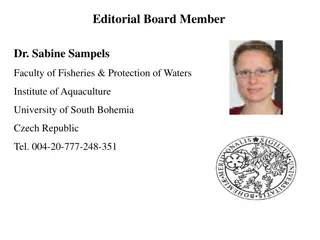Premium quality Natural and Organic Dry Fish Anchovies (500gm)
Dry Fish - Anchovies (500 grams) , free shipping worldwide\n\nProduct description\n\nSize:500 grams\n\nAnchovies are a kind of small dried fish contains very high percentage of calcium, proteins, and omega -3-fatty acids, minerals, and vitamins, for healthy body and mind. Dry fish anchovies are comm
0 views • 3 slides
Understanding Remote Sensing Sensor Resolutions & Colour Composite
Explore the art and science of remote sensing, detailing sensor types, resolution categories, and color composite techniques. Learn about the stages involved in remote sensing, sensor variations, and band designations for satellites like Landsat 8. Discover the significance of pixel, high-resolution
3 views • 13 slides
Understanding Composite Fish Culture for Increased Productivity
Composite fish culture involves stocking different fish species with varying feeding habits in the same pond to optimize space and resources. This method allows for the utilization of all niches in the pond, leading to assured production and easy management. The article covers the species involved,
6 views • 16 slides
Understanding Composite Materials: Reinforcement and Matrix in Composites
Composite materials consist of reinforcement and matrix components, each serving a specific purpose to enhance the properties of the composite. The reinforcement phase provides strength and stiffness, while the matrix transfers loads and protects the fibers. Different types of reinforcements and mat
8 views • 18 slides
Understanding the Rule of Mixtures in Composite Materials
The Rule of Mixtures (ROM) is a weighted method for predicting the properties of composite materials, such as fiber-reinforced polymers (FRP). This method relies on assumptions regarding the homogeneity and properties of fibers and matrices. By combining volume fraction and properties linearly, the
5 views • 23 slides
Understanding Fish Ecology: Interactions, Diversity, and Environmental Factors
Fish ecology involves studying the distribution, interactions, and abundance of fish species in different ecosystems. This lab delves into the divisions of ecology, fish species diversity in marine and freshwater ecosystems, and the environmental factors affecting fish diversity and abundance. Disco
1 views • 7 slides
All About Fish and Shellfish: Types and Characteristics
Explore the world of seafood with a detailed overview of fin fish, shellfish, and their various sub-categories. Learn about the characteristics of white fish, including flat and round varieties, as well as oily fish. Discover the differences between fin fish and shellfish, such as crustaceans and mo
1 views • 18 slides
Fish Processing and Preservation Methods for Quality and Longevity
Fish are highly perishable and require proper preservation techniques to maintain their quality and freshness. Methods such as chilling, freezing, and other preservation techniques are employed to extend the shelf life of fish for short and long durations. Quick freezing is preferred for long-term s
1 views • 17 slides
Overview of Fish Harvesting, Handling, and Transportation
Fish harvesting is crucial for providing valuable animal protein, with India being a key player in fish production. Fisheries are categorized into fin and non-fin types, with capture and culture fisheries being common practices. Capture fisheries involve natural species recruitment in sea and inland
2 views • 16 slides
Organic vs Conventional Farming: An Overview
In the debate between organic and conventional farming, both methods have their pros and cons. While organic foods are perceived to follow stricter safety standards, both types meet FDA and USDA regulations. They offer similar nutritional value, but organic farming tends to have lower efficiency due
0 views • 6 slides
Fish Breeding and Spawn Management Techniques by Dr. S.P. Sahu
Dr. S.P. Sahu, an Assistant Professor at Bihar Veterinary College in Patna, provides valuable insights into fish breeding and spawn management. The content covers fish seed collection, procurement methods, fry identification, and confined water breeding techniques. Detailed information on Indian maj
2 views • 26 slides
Diverse Methods of Poultry Farming and Agricultural Practices
Poultry farming practices such as organic farming, nitrogen fixation, biodiversity management, and contract farming are discussed. Organic farming emphasizes holistic relationships in agriculture, promoting sustainable production. Nitrogen fixation and biodiversity management play essential roles in
0 views • 20 slides
Composite Fish Farming: An Innovative Aquaculture Technique
Composite fish farming is a popular aquaculture technique where different compatible fish species are cultured together in ponds to maximize fish production. Researchers from India and abroad have contributed significantly to this field. The practice involves combining Indian major carps like Catla,
1 views • 19 slides
Evolution of Livestock-based Livelihoods and Capitalistic Farming Systems
Livestock-based livelihoods have evolved over time, with capitalistic farming systems emerging as prominent in regions like South America, North America, and Europe. These systems are characterized by individual entrepreneurs controlling farming activities. Plantations are a common example of capita
0 views • 10 slides
Understanding Composite Materials: Properties and Applications
Composite materials are combinations of chemically distinct substances that offer improved properties over individual materials. They can be natural or synthetic, with examples like wood and bamboo. Composites consist of reinforcing fibers or particles embedded in a matrix material. Smart materials,
1 views • 9 slides
Evolution of Fish Farming in Ghana: A Historical Overview
Fish farming in Ghana has a rich history dating back to the 1950s. The industry has evolved significantly over the decades, from traditional methods to modern practices like low-input commercial farming. Despite challenges like lack of technical support, the sector has shown growth with a focus on k
9 views • 22 slides
Understanding Cage Culture in Aquaculture
Cage culture involves cultivating fish in meshed boxes submerged in water bodies like rivers, lakes, estuaries, and seas. Originating about 200 years ago, it has evolved into an intensive aquaculture method. Components like cage frame, floats, sinkers, and nets play crucial roles in this farming tec
1 views • 16 slides
Guide to Fish Rescue from Turbine Dewatering Process
Detailed procedure for rescuing fish from turbine dewatering, including steps like hoisting sturgeon, salvaging fish in tanks, and using gantry cranes to transport them. The process involves specialized equipment and careful handling to ensure the safety of the fish. Images illustrate key steps in t
2 views • 9 slides
Livestock-based Livelihoods and Farming Systems Evolution
Livestock-based livelihoods and farming systems have evolved over time, aiming to produce food and crops sustainably. Small-scale farming, farm management, types of farming, and various farming systems like specialized and diversified farming play key roles in enhancing productivity, profitability,
9 views • 19 slides
Understanding Composite Functions in Mathematics
Composite functions in mathematics involve applying two functions in succession, yielding a new function known as the composite. By evaluating functions in a specific order and considering their ranges and domains, composite functions provide a powerful tool for mathematical analysis.
1 views • 10 slides
Evolution of Dental Restorative Materials: From Silicate Cement to Composite Resins
Various dental restorative materials have evolved over the years, from silicate cement to composite resins. Silicate cement, introduced in 1871, offered advantages like matching tooth color but had drawbacks such as dental pulp irritation. Unfilled acrylic polymers, developed around 1945, showed imp
2 views • 11 slides
Understanding Fish Mouth Positions and Feeding Habits
The position of a fish's mouth reveals valuable information about its feeding habits, behavior, and lifestyle. Fish mouths can be categorized as superior (upward-facing), terminal (forward-facing), or inferior (downward-facing), each adapted for specific feeding strategies. Superior mouths are ideal
5 views • 10 slides
Contract Farming in India: A Case Study of Potato Cultivation
Value addition in Indian agriculture is low due to poor processing levels. Contract farming is being considered to integrate agriculture production into the global value chain, but concerns about unequal bargaining power between farmers and corporations exist. Various forms of contract farming exist
0 views • 26 slides
All You Need to Know About Hilsa Fish
Hilsa herring, also known as Hilsa shad, is a sought-after food fish in the Indian Subcontinent, particularly in Bangladesh, India, and West Bengal. This marine species belongs to the herring family, Clupeidae, and can grow up to 60cm in length. It is an anadromous fish, schooling in coastal waters
0 views • 5 slides
Understanding Centroid and Centre of Gravity in Composite Figures
Learn how to locate and calculate the centroid of composite plane figures and the centre of gravity of composite solids, with detailed examples of squares, rectangles, triangles, and circles.
1 views • 8 slides
Challenges and Future Trends in Aquaculture Farming Practices
Aquaculture, or fish farming, involves farming species like salmon, trout, and carp in various facilities ranging from artificial ponds to coastal cages. Challenges in planning and management include finding suitable sites, maintaining water supply, ensuring proper physical and chemical conditions,
1 views • 4 slides
Studies in the Use of Algae in Fish Nutrition by Dr. Peter Perschbacher
Dr. Peter Perschbacher, an Associate Professor at the University of Arkansas, specializes in exploring the benefits of algae in fish nutrition. His research interests include polycultures, algae as fish meal replacements, alligator gar ecology, and more. He has received numerous honors and awards fo
0 views • 28 slides
Managing Fish Barriers in Scotland: Improving Water Environments
The management plans and implementation of fish barriers measures in Scotland aim to address key pressures on the water environment, such as fish migration, physical condition, and pollution. The initiative involves categorizing barriers, taking actions on fish migration, scoping barriers, assessing
0 views • 9 slides
Agricultural Practices and Major Crops in India
India is predominantly an agricultural-based country with two-thirds of its population engaged in farming. The country practices different types of farming, including primitive subsistence farming, intensive subsistence farming, and commercial farming. The cropping seasons in India are classified as
0 views • 8 slides
Contract Farming in India: Enhancing Agricultural Value Chain Through Partnerships
Value addition in Indian agriculture has been low due to limited processing levels. Contract farming is emerging as a viable solution to integrate agriculture production into the global value chain, albeit with concerns about unequal bargaining power. Various forms of contract farming exist, with ex
0 views • 26 slides
Solving the Piscatorial Percentages Problem
The "Piscatorial Percentages" problem involves a fish tank with 200 fish, 98% of which are small. By removing a certain number of small fish, the goal is to leave 96% of the total fish as small fish. Two approaches are discussed to reach the solution, resulting in the removal of 100 small fish in bo
0 views • 25 slides
Understanding Aquatic Epidemiology in Fish Populations
Aquatic epidemiology is a crucial branch of science that focuses on describing the health, diseases, and welfare of fish populations. It involves studying diseases in wild and hatchery-raised fish, identifying factors influencing disease occurrence, and conducting diagnostic investigations to mainta
0 views • 12 slides
Challenges and Solutions in Fish Truck Fleet Logistics
Addressing the complexities of managing a large and aging fish truck fleet, the challenges include maintaining safety, operational costs, fleet efficiency, and replacement timing. Solutions involve collaboration with hatchery managers, experts' advice on fleet replacement, and working with agencies
0 views • 11 slides
Understanding Composite Matrix Materials in Engineering
Composite materials are made of reinforcing fibers and matrix materials, with the matrix serving to protect and enhance the properties of the composite. There are three main types of composite matrix materials: metal matrix composites (MMC), ceramic matrix composites (CMC), and polymer matrix compos
0 views • 22 slides
Integrated Farming System on Coastal Land: A Case Study in Pandan Simo, Bantul, DIY
The coastal area in Pandan Simo, Bantul, is embracing integrated farming systems combining food crops, horticulture, and livestock due to diminishing agricultural land. Farming on marginal lands like beaches has become a prevalent alternative. This case study aims to assess farming feasibility and r
0 views • 10 slides
Evolution of Livestock-Based Livelihoods: From Estate Farming to Specialized Crop Cultivation
Estate farming, a form of industrialized agriculture introduced by the British in the 19th century, involves large monocultures of cash crops like tea, rubber, and spices. It requires significant investment in modern farming techniques, machinery, and skilled labor. Estate farming is capital-intensi
0 views • 8 slides
Study on Climate Change and Organic Farming Impact by Madhyanchal Forum
Madhyanchal Forum conducted a study on the impact of climate change on agriculture and the effectiveness of organic farming in mitigating climate change. The study involved various organizations and farmers across different regions, focusing on the adoption of sustainable farming practices. Detailed
0 views • 16 slides
Dr. Sabine Sampels: Research on Aquaculture, Fish Quality, and Human Health
Dr. Sabine Sampels, a member of the Editorial Board at the University of South Bohemia, Czech Republic, specializes in studying the effects of fish consumption on human health, animal nutrition on fish quality, and lipid metabolism. With a background in Food Chemistry and extensive research experien
0 views • 25 slides
Understanding Prime Factorization for Prime and Composite Numbers
Learn about prime and composite numbers, prime factorization, and how to identify them using examples. Discover the concept of factors, prime numbers, composite numbers, and prime factors through this educational presentation. Explore how every composite number can be expressed as a product of prime
1 views • 8 slides
Understanding Prime and Composite Numbers with GCF
Explore the concepts of prime and composite numbers, the difference between them, and how to find the Greatest Common Factor (GCF). Prime numbers have only two factors, 1 and the number itself, like 2, 3, 5. Composite numbers have more than two factors, such as 4, 6, 8. Learn to identify prime and c
0 views • 12 slides
